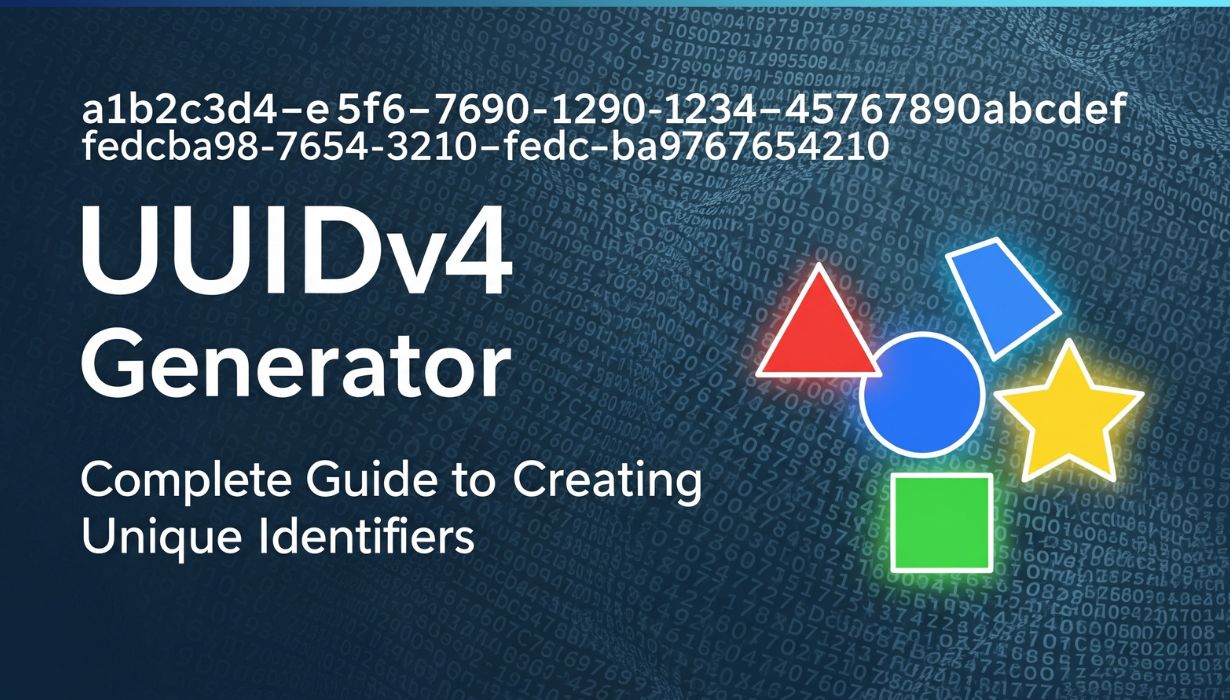
26
UUIDv4 Generator What It Is How It Work and Best Use Cases
Learn what a UUIDv4 Generator is, how it works, and why it’s essential for unique IDs in databases, APIs, security, and modern applications
UUIDv4 Generator Complete Guide to Creating Unique Identifiers
In the digital world unique identifiers are essential Whether you are building databases APIs or distributed systems, you need a way to generate IDs that are nearly impossible to duplicate. This is where UUIv4 Universally Unique Identifier version 4 comes into play
A UUIDv4 Generator is a tool that creates random identifiers that conform to the UUID version 4 standard These identifiers are widely used in programming cloud systems and data management because they ensure uniquness without requiring a central authority
In this guide we’ll explore what UUIDv4 is how it works why it matters and how you can generate UUIDs for your project
What Is UUIDv4
UUID stands for Uiversally Unique Identifier It is a 128-bit value represented as a string of 32 hexadecimal characters displayed in 5 groups separated by hyphens
Why Use a UUIDv4 Generator
Uniqueness
UUIDv4 provides practically unique identifiers, making them perfect for distributed systems
No Central Authority Needed
Unlike sequential IDs UUDv4 does not require a central database to track values
Scalability
Applications can generate millions of IDs independently without risk of collisions
Security
UUIDv4 is harder to guess than squential IDs making it safer for URLs and public identifiers
Standardization
UUIDs are supported in all major programming languages and databases
Where UUIDv4 Is Used
1. Databases
Instead of auto-increment IDs many modern databases use UUIDs to avoid collisions when merging data from multiple sources
2. APIs
UUIDs are used as resource identifiers in REST APIs because they are unique and secure
3. Distributed Systems
Cloud services and microservices rely on UUIDs for unique references across servers
4. Authentication and Tokens
Session IDs, user IDs, and access tokens often use UUIDs
5. File Naming
UUIDs are used to generate unique file names in stage systems
UUIDv4 vs. Other Versions
UUIDv1 Based on timestamp and machine ID (can leak system info
UUIDv3 Based on namespace name using MD5 hashing
UUIDv4 Based on namespace + name, using SHA-1 hashing
UUIDv5 Purely random, best for most use cases
UUIDv4 is the most common because it balances simplicity uniqueness and security
Online UUID Generators
There are many free online tools where you just click “Generate” to get a UUIDv4 instantly
Benefits of Using Online UUIDv4 Generators
Free and instant
Cross-platform (no coding needed)
Bulk generation (create hundreds at once)
Copy and export features for convenience
Security Considerations
While UUIDv4 is random and hard to guess, keep in mind
- UUIDs are not encrypted—they just provide uniqueness
- For sensitive applications, combine UUIDs with authentication and encryption
- Do not rely solely on UUIDv4 for security tokens without proper protection
Frequently Asked Quetions
1. Is UUIDv4 really unique
Yes, the probability of collision is so small it’s considered negligible
2. Can I use UUIDv4 for database keys
Yes, many modern databases support UUIDs, though they may use more storage than integers
3. Do UUIDv4 values expire?
No, once generated, a UUIDv4 is permanent
4. Is UUIDv4 safe for public URLs?
Yes, because they are difficult to predict
5. Can I generate UUIDv4 offline
Yes, using libraries in Python JavaScript Java Go and many other languages
Conclusion
A UUIDv4 Generator is one of the simplest yet most powerful tools in modern software development It allows developers businesses and systems to create identifiers that are unique secure and globally recognize
Whether you need unique database keys API resource identifiers or simply a way to generate random IDs UUIDv4 is a reliable solution With online tools programming libraries and built in system commands generating UUIDv4s has never been easier
By adopting UUIDv4, you future-proof your applications and ensure that every identifier you generate will remain unique in a world filled with billions of digital records
Contact
Missing something?
Feel free to request missing tools or give some feedback using our contact form.
Contact Us